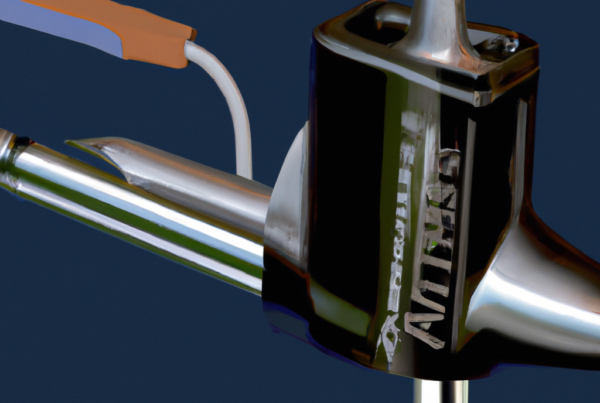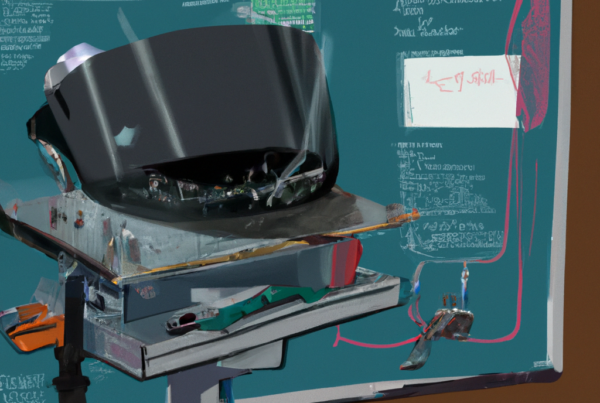When it comes to welding, there’s no getting around the question of whether AC or DC is the superior choice. AC and DC welders both have their place in the industry, but the right one for your job depends on your welding applications and the materials you are working with. AC welders are more affordable and easier to use than DC welders, but DC welders provide more precise control and are better suited for heavier duty applications. So, if you’re looking to get the job done right, you need to understand the difference between AC and DC welders and decide which is better for your job.

What is the difference between AC and DC welders?
The main difference between AC and DC welders is the type of current they use. AC welders use alternating current, which constantly changes direction, while DC welders use direct current, which flows in one direction.
Which one is better for welding depends on the type of material being welded and the thickness of the material. Here are some of the differences between AC and DC welders and when each is best suited for welding:
- AC welders produce a lower voltage and amperage, making them ideal for thinner materials. They are also better for welding aluminum due to the lower heat generated.
- DC welders produce a higher voltage and amperage, making them better for thicker materials. They are also better for welding steel due to the increased heat generated.
Ultimately, it depends on the type of material and thickness being welded. AC welders are best for thinner materials and aluminum, while DC welders are best for thicker materials and steel.
What are the advantages of AC welders?
AC welders offer several advantages over DC welders. Here are some of the key benefits:
- AC welders are more cost-effective than DC welders, as they require less power and are often cheaper to purchase and maintain.
- AC welders offer more flexibility for welding different materials and thicknesses. AC welders can be used to weld ferrous and non-ferrous metals, as well as stainless steel.
- AC welders are easier to use than DC welders, as they can be used with a wide variety of welding processes such as MIG, TIG, and Stick welding.
- AC welders are safer to use than DC welders, as they do not require a high voltage to operate, which reduces the risk of electrical shock.
Overall, AC welders offer a number of advantages over DC welders, making them the preferred choice for many welders.
What are the advantages of DC welders?
DC welders have a number of advantages over AC welders. Here are some of the key benefits of using a DC welder:
- DC welders offer a much smoother and more consistent arc than AC welders.
- DC welders are much easier to control with less splatter and spatter.
- DC welders provide greater penetration of the weld and higher quality welds.
- DC welders are more efficient and use less power than AC welders.
- DC welders have a faster reaction time, which allows for a faster welding speed.
- DC welders can be adjusted to accommodate different thicknesses of metal.
Overall, DC welders offer more control, efficiency, and quality than AC welders, making them a great choice for welding projects.
What types of welding does each welder support?
TIG welders use a non-consumable electrode to create a high-quality, precise weld. They can be either AC or DC-powered and can be used for a range of metals, including stainless steel, aluminum, and copper.
MIG welders use a metal consumable wire electrode to create strong welds. They are typically AC or DC-powered and are used for both ferrous and non-ferrous metals.
Stick welders use a consumable electrode to create a weld. They are typically AC or DC-powered and can be used for a range of metals, including mild steel, stainless steel, aluminum, and cast iron.
When deciding between an AC or DC welder, it is important to consider the type of welding you are doing, the type of metal, and the desired quality of the weld. AC welders are better for welding aluminum and thin metals, while DC welders are better for thicker metals. DC welders are also better for achieving a higher quality weld.
What factors should you consider when deciding between an AC or DC welder?
When deciding between an AC or DC welder, there are several factors to consider:
- Cost – AC welders are typically more affordable than DC welders.
- Ease of use – AC welders are generally easier to use than DC welders.
- Versatility – DC welders are more versatile than AC welders, as they can be used for a wider range of welding jobs.
- Power – AC welders are generally more powerful than DC welders.
- Safety – AC welders are generally safer to use than DC welders, as they don’t produce as much heat.
Ultimately, the decision between an AC or DC welder will depend on the specific welding job you’ll be doing and your budget.
What safety precautions should you take when using an AC or DC welder?
When using an AC or DC welder, it is important to take the proper safety precautions. Here are some tips to help you stay safe when welding:
- Wear proper protective gear, such as face shields, gloves, and fire-resistant clothing.
- Ensure that the welding area is well-ventilated.
- Inspect your welding equipment regularly for any damage.
- Keep flammable materials away from welding areas.
- Do not weld while standing on a ladder or any other unstable surface.
- Do not touch the electrode or workpiece until it has cooled off.
- Make sure the welding current is not set too high.
When deciding between an AC or DC welder, the best option depends on the type of welding job you are doing. AC welders are typically used for light-duty welding jobs while DC welders are better suited for heavier-duty welding jobs. Both types of welders offer their own advantages and disadvantages, so it’s best to research which one is best suited for your particular welding project.
What is the cost difference between an AC and DC welder?
The cost difference between an AC and DC welder depends on the type and power rating of the welder. Generally speaking, AC welders are more expensive than DC welders.
AC welders have the advantage of being able to handle more complex welding tasks, such as welding aluminum and cast iron. They are also more efficient, as they can adjust the welding current to match the material being welded. This makes them ideal for high-end welding jobs.
DC welders, on the other hand, are generally cheaper and easier to use. They are best used for welding mild steel and stainless steel, and are the preferred choice for most home welders. However, they are not as efficient as AC welders and may not be able to handle more complex welding tasks.
When deciding which type of welder is better for your needs, it is important to consider the cost, efficiency, and ease of use. AC welders may be more expensive, but they offer greater versatility and efficiency. DC welders, on the other hand, are typically cheaper and easier to use, but may not be suitable for more demanding welding tasks.
What materials can be welded with an AC or DC welder?
Welders that use Alternating Current (AC) or Direct Current (DC) can weld a variety of metals such as steel, aluminum, and copper. Some of the most common materials welded with an AC or DC welder include:
- Steel alloys
- Stainless steel
- Aluminum
- Cast iron
- Copper
- Bronze
- Nickel alloys
- Titanium
When deciding between an AC or DC welder, it really depends on the type of material you are welding. AC welders are typically used for welding thicker materials such as steel, while DC welders are used for welding thinner materials such as aluminum. AC welders are also better for welding longer periods of time, while DC welders are better for short bursts of welding.
Are AC or DC welders better for beginner welders?
AC and DC welders are both suitable for beginner welders. However, it is important to understand the differences between the two welding processes in order to make an informed decision.
DC welders are generally considered easier to use as they are more forgiving. The arc is more stable and less prone to interference from wind and drafts. DC welders are also lighter in weight and less expensive than AC welders.
AC welders are often more powerful than DC welders, providing higher amp output to weld thicker materials. AC welders are also more suitable for outdoor welding as they are more resistant to wind interference.
Overall, DC welders are better for beginner welders as they are easier to use and provide more consistent results. However, if you plan on welding thicker materials or welding outdoors, an AC welder may be the better option.
What are the most popular AC and DC welders?
The two most popular types of welders are AC and DC welders. AC welders are more versatile and can be used to weld a variety of metals, including aluminum and stainless steel. DC welders, on the other hand, are suited for welding steel and cast iron. When it comes to choosing which type of welder is best, it really depends on what you’re welding and the desired outcome.
Here are some of the most popular AC and DC welders:
- AC welders: Miller AC/DC welders, Lincoln Electric Power MIG welders, and ESAB Rebel welders.
- DC welders: Miller Dynasty welders, Lincoln Electric Invertec welders, and ESAB Multi-Process welders.
The type of welder that is best for a particular job depends on the material being welded, the size of the work piece, and the desired outcome. AC welders are generally considered the better option for welding aluminum and stainless steel, while DC welders are better for welding steel and cast iron. It’s important to choose a welder that is suited to the job at hand for the best results.



